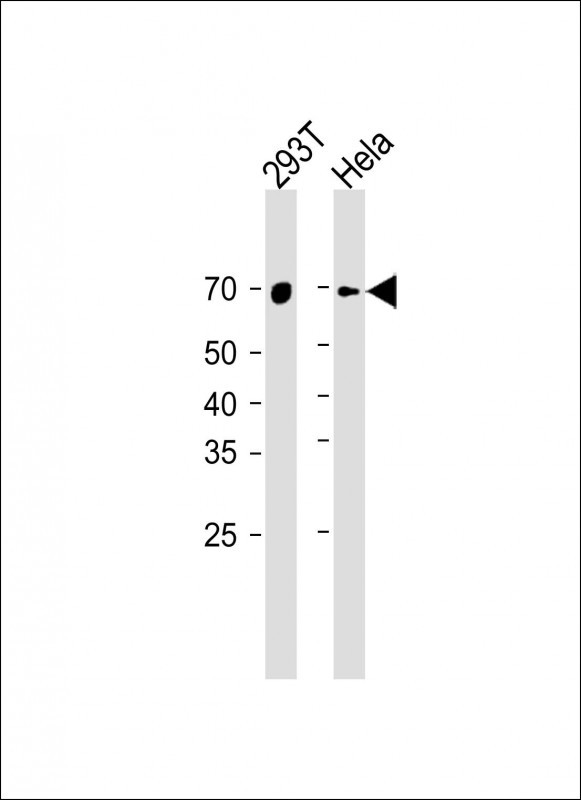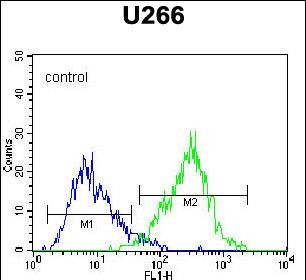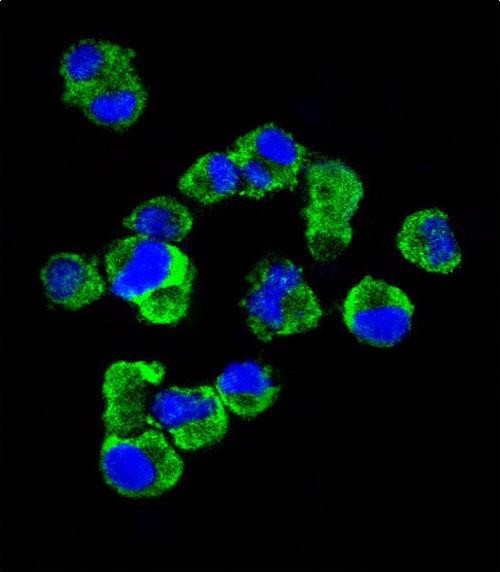CD138 Antibody (C-term) (Ascites)
Mouse Monoclonal Antibody (Mab)
- 产品详情
- 文献引用 : 1
- 实验流程
- 背景知识
Application
| WB, FC, IF, E |
|---|---|
| Primary Accession | P18827 |
| Other Accession | NP_001006947.1 |
| Reactivity | Human |
| Host | Mouse |
| Clonality | Monoclonal |
| Isotype | IgM |
| Clone Names | 587CT7.3.6.5 |
| Calculated MW | 32462 Da |
| Antigen Region | 210-238 aa |
| Gene ID | 6382 |
|---|---|
| Other Names | Syndecan-1, SYND1, CD138, SDC1, SDC |
| Target/Specificity | This CD138 antibody is generated from mice immunized with a KLH conjugated synthetic peptide between 210-238 amino acids from the C-terminal region of human CD138. |
| Dilution | WB~~1:1000 FC~~1:10~50 IF~~1:10~50 E~~Use at an assay dependent concentration. |
| Format | Mouse monoclonal antibody supplied in crude ascites with 0.09% (W/V) sodium azide. |
| Storage | Maintain refrigerated at 2-8°C for up to 2 weeks. For long term storage store at -20°C in small aliquots to prevent freeze-thaw cycles. |
| Precautions | CD138 Antibody (C-term) (Ascites) is for research use only and not for use in diagnostic or therapeutic procedures. |
| Name | SDC1 (HGNC:10658) |
|---|---|
| Synonyms | SDC |
| Function | Cell surface proteoglycan that contains both heparan sulfate and chondroitin sulfate and that links the cytoskeleton to the interstitial matrix (By similarity). Regulates exosome biogenesis in concert with SDCBP and PDCD6IP (PubMed:22660413). Able to induce its own expression in dental mesenchymal cells and also in the neighboring dental epithelial cells via an MSX1-mediated pathway (By similarity). |
| Cellular Location | Membrane; Single-pass type I membrane protein. Secreted Secreted, extracellular exosome Note=Shedding of the ectodomain produces a soluble form |
| Tissue Location | Detected in placenta (at protein level) (PubMed:32337544). Detected in fibroblasts (at protein level) (PubMed:36213313). |
For Research Use Only. Not For Use In Diagnostic Procedures.

Provided below are standard protocols that you may find useful for product applications.
BACKGROUND
The protein encoded by this gene is a transmembrane (type I) heparan sulfate proteoglycan and is a member of the syndecan proteoglycan family. The syndecans mediate cell binding, cell signaling, and cytoskeletal organization and syndecan receptors are required for internalization of the HIV-1 tat protein. The syndecan-1 protein functions as an integral membrane protein and participates in cell proliferation, cell migration and cell-matrix interactions via its receptor for extracellular matrix proteins. Altered syndecan-1 expression has been detected in several different tumor types. While several transcript variants may exist for this gene, the full-length natures of only two have been described to date. These two represent the major variants of this gene and encode the same protein.
REFERENCES
Tsai, E.W., et al. Transplantation 90(8):875-881(2010) Hozumi, K., et al. FEBS Lett. 584(15):3381-3385(2010) Zyada, M.M., et al. Ann Diagn Pathol 14(3):153-161(2010) Al-Shibli, K., et al. APMIS 118(5):371-382(2010) Szumilo, J., et al. Folia Histochem. Cytobiol. 47(4):571-578(2009)
终于等到您。ABCEPTA(百远生物)抗体产品。
点击下方“我要评价 ”按钮提交您的反馈信息,您的反馈和评价是我们最宝贵的财富之一,
我们将在1-3个工作日内处理您的反馈信息。
如有疑问,联系:0512-88856768 tech-china@abcepta.com.






















 癌症的基本特征包括细胞增殖、血管生成、迁移、凋亡逃避机制和细胞永生等。找到癌症发生过程中这些通路的关键标记物和对应的抗体用于检测至关重要。
癌症的基本特征包括细胞增殖、血管生成、迁移、凋亡逃避机制和细胞永生等。找到癌症发生过程中这些通路的关键标记物和对应的抗体用于检测至关重要。 为您推荐一个泛素化位点预测神器——泛素化分析工具,可以为您的蛋白的泛素化位点作出预测和评分。
为您推荐一个泛素化位点预测神器——泛素化分析工具,可以为您的蛋白的泛素化位点作出预测和评分。 细胞自噬受体图形绘图工具为你的蛋白的细胞受体结合位点作出预测和评分,识别结合到自噬通路中的蛋白是非常重要的,便于让我们理解自噬在正常生理、病理过程中的作用,如发育、细胞分化、神经退化性疾病、压力条件下、感染和癌症。
细胞自噬受体图形绘图工具为你的蛋白的细胞受体结合位点作出预测和评分,识别结合到自噬通路中的蛋白是非常重要的,便于让我们理解自噬在正常生理、病理过程中的作用,如发育、细胞分化、神经退化性疾病、压力条件下、感染和癌症。








